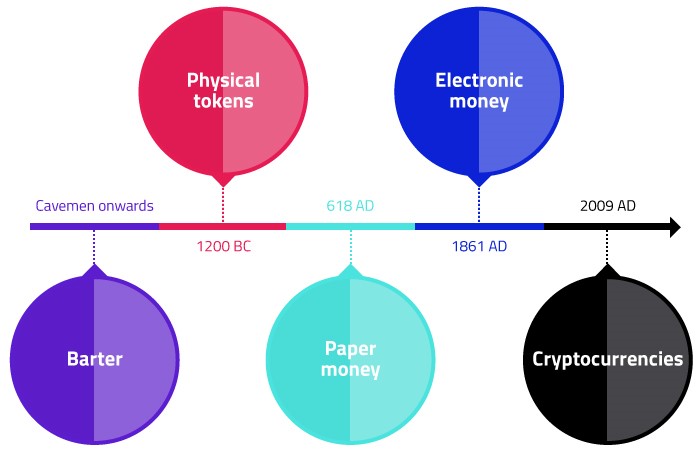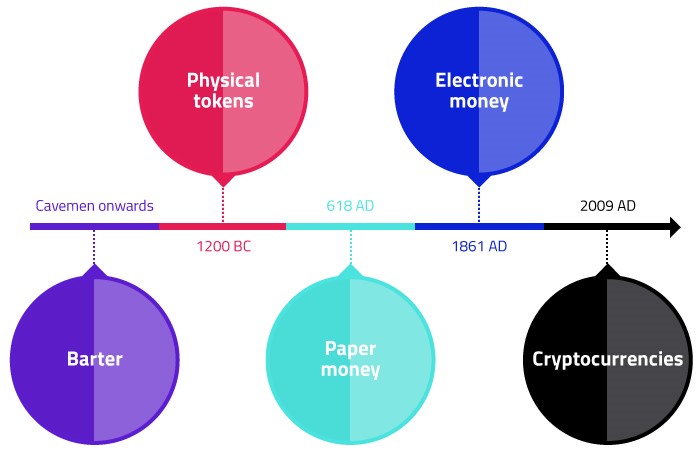Facebook made a huge step forward towards making a cryptocurrency of their own called Libra by introducing a white paper for the project. Presented as an innovative “global currency” that would “empower billions of people,” Facebooks’ brainchild will not adhere to the principles considered to be the cornerstone of the blockchain technology.
Let’s take a look at the core problem of Libra, and discuss why I don’t think the project will (and shouldn’t) catch on.
Progress and Innovation — Where Does Libra Fit in?
It is pretty obvious why we want digital cash now more than ever. Trade is global nowadays, and it needs to rely on a secure, cheap, and reliable way to transfer value, which is something programmable money can offer. Moreover, governments understand the importance of such technology too and are interested in exploring possible solutions that would aim to terminate paper cash.
What does programmable money bring to the table? First of all, it makes transactions more efficient, offering predictable outcomes and making it harder for you to cheat the system. Fiat money makes room for Ponzi schemes, money laundering, and all other kinds of fraud that would fill the pockets of people who orchestrate them.
Therefore, whether you are big on crypto or not, you must admit that the current format in which money exists is far from perfect. With a better solution in sight, the currently popular money format is bound to be replaced soon.
Being the first of its kind, bitcoin already showed how programmable money can disrupt the world around us. It enabled us to transcend the system that involves intermediaries and introduced digital cash. Furthermore, the “digital gold” brought scarcity to the digital world, which is a great innovation. Ultimately, this cryptocurrency gave us an apolitical and global settlement tool.
What many perceive as the biggest advantage of bitcoin is that it offered an alternative to banks — an ethical and moral step forward, many would claim. However, it's not all roses in the world of bitcoin, as it came with a set of drawbacks that are in the process of being resolved. But drawbacks are good — they are the very definition of progress and innovation.
Progress and innovation. These two keywords were an essential element to every “eureka” that has ever been shouted from the rooftops. But are they as equally important in Libra?
Facebook’s Libra Is a Replica
I think the innovation part could be dismissed immediately, as Facebook just replicated what WeChat already did in China and called it Libra. Putting something on a DLT and calling it innovative is actually a step backward, as DLT systems nowadays can and do offer value outside of crypto. In fact, to truly call a DLT system innovative requires having an innovative business model as well, and Libra simply isn’t one. Why do they want to make it, then?
Being the owner of the biggest social medium in the world, Zuckerberg (together with his team) has a vast user base they could capitalize on if they built the next digital bank or the next PayPal. Essentially, they are right to do that, from a purely business perspective.
Libra is there to drive up company profits and keep Facebook relevant in the 2020’s. However, what makes Libra stand out from an average 2017 ICO is that Facebook will not rely on just another ERC-20 token and all the volatility that comes with it. They will not try to grow investor profits through pump and dump of Zuck Bucks. Instead, they will use a stable token to raise their share price in order to accommodate shareholders through the stock market they already understand.
A lot of the things going on with Libra are just that — Facebook using the same mechanisms they learned over the last 15 years and their 2,3 billion daily active users to try and get into the banking and payments business.
Regulators invited tech companies to disrupt traditional bank services with initiatives such as Open Banking and PSD2 directive as the main force behind it. That is to be expected from more and more major corporations. Some will build their systems themselves and some will jump onto the Libra bandwagon. Some will do both.
By entering the banking and payments industry the way they did with Libra, Facebook showed us they understand marketing, payments, data mining, and technology, but also that they basically don’t know anything about money or peer-to-peer.
In order to further discuss Libra’s take on progress (and innovation?), we have to go one step beyond and talk about the underlying technology used by Facebook’s crypto — blockchain.
Is Blockchain an Innovation at All?
Of course it is, but not in the way Facebook understands or portrays it.
By now, more and more corporate people came to believe that it's not cryptocurrencies that are innovative, but the blockchain technology. In fact, 80% of companies are planning to implement blockchain, according to a recent Deloitte study, but crypto is nowhere to be found in these plans.
Cryptocurrencies and blockchain assumed a good/evil distinction among the public, with blockchain representing order and cryptos being synonymous to anarchy. Facebook understands the overall positive attitude towards blockchain in comparison to the negativity that still surrounds cryptocurrencies. Therefore, it wants us to use blockchain as it is recognizable and liked now, offering security, privacy, trust, and innovation.
But that is not the real innovation at play here. The idea of distributed ledger systems that blockchain is based on is actually very old.
BFT/DLT Systems Are an Old Concept
Fault-tolerant and self-correcting systems existed way before blockchain. As a matter of fact, if we define blockchain simply as a BFT/DLT system, then we can claim that we had those since the 1970s. Simply put, Distributed Ledgers and Distributed Transactional Databases are old concepts.
They are also one of the more inefficient ways to build a distributed system. The person who convinced big corporations that the idea of a DLT is innovative effectively sold them a 50-year-old product and is a marketing genius.
NASA employed Byzantine Fault-Tolerant and Self-Stabilizing Protocol systems to send Neil Armstrong to the Moon. To be precise, BFT systems were used for fault tolerance before the Moon landing, and the first person to conceive and formalize the Byzantine consensus obtainment problem was Robert Shostak back in 1978 as a part of the SIFT project that was sponsored by NASA.
A distributed system is a group of computers working together to achieve a unified goal. Every distributed system has to deal with faulty processes, message passing, lack of a global clock, and concurrency of processes. This is not specific to Bitcoin or blockchain.
Therefore, blockchain is not synonymous to a distributed system. It is rather a specific type of distributed system which brought huge innovation to the way we view consensus mechanisms in these systems in both theory and practice.
Before Bitcoin, it was not possible to launch a piece of software on a computer and start validating blockchain transactions while ignoring the time difference between geographically distant participants, leader election, communication overhead, etc.
The consensus model created by Bitcoin makes it possible for any number of nodes to have open participation, and no one has to know the full set of participants by design.
This is a huge breakthrough and innovation. It is similar to a more user friendly and practical way we look at Byzantine Fault Tolerant (BFT) systems - practical Byzantine Fault Tolerant (pBFT) systems are focused on working in asynchronous environments, such as the Internet, where the speed of reaching consensus is also very important, but it is not defined by PBFT or limited to the fact it uses a ledger.
Therefore, if blockchain is perceived as nothing more than just another DLT/BFT system, it is safe to say that it has been around since the 70s. An even braver claim is that it was used for spaceflight. Those NASA hipsters made a practical blockchain application 40 years before it was popular. They even sent people to the Moon with it!
To sum up — if Libra is a cryptocurrency, then blockchain is spaceflight.
So What Is Libra Then?
Essentially, Libra is a form of digital money operated by a corporation, or consortium of corporations, looking to become a mobile bank enabled by FinTech, Open Banking, and PSD2 directive. This idea is not new, but given that Facebook has a huge user base, they do have an upper hand as they would be able to capitalize on the users.
However altruistically displayed in the white paper, the project would bring Facebook the most benefits. If that happens, the social media giant would have more control over financial transactions and flow of money, meaning they would control freedom of speech as a centralized system.
From a technical standpoint, Libra did some nice work and open-sourced it, but from a business perspective, everything they did could be achieved by a distributed database shared between all the consortium members. The only reason Libra wants to “cry blockchain” and be defined as such is to try and exploit regulatory loopholes and plead that you entrust your money to Facebook & friends.
Centralization and control aside, every project is successful if people adopt it, but will they do it if they have other options? Although Libra does have the potential to make banks’ blood run cold, it might as well end up in Facebook’s unsuccessful projects graveyard, which is already pretty crowded at the moment. In fact, Facebook had already tried something similar before introducing Libra but failed to deliver satisfying results.
A Short History of Facebook’s Projects (and Their Failures)
I am really curious why people think Libra would be successful, considering the privacy, regulatory, and adoption difficulties it would need to face. "Because it's Facebook and they have so many users and power" is not really a valid argument. Facebook had its share of flops.
Facebook Credits
The social medium introduced a type of virtual currency called Facebook Credits that was active from 2009 to 2011, enabling users to purchase items in FB games and non-gaming applications. Ten Facebook Credits were an equivalent to $1, and they were available in 15 currencies, including the US dollar, euro, Danish krone, pound sterling, and more.
The entire project did not make the grade as not enough people were interested in it. Furthermore, the company did not encourage sharing and developers did not really understand the possibilities that could have been explored. It was a golden opportunity for FB to disrupt banking back then.
Facebook Deals, Home, Gifts, Offers, Notify, and Inbox
Facebook continued with a series of unsuccessful projects after Credits, trying to stay up-to-date with the latest technologies and trends and to provide valuable competition to similar projects at the time.
In April 2011, FB launched a coupon service called Facebook Deals to compete with Groupon. It closed after just four months. Then, in 2012, the platform introduced Facebook Gifts and Facebook Offers — two different apps for gifts and gift coupons. Neither made it past 2013.
Moreover, in 2013, the company released Facebook Home, a home skin for Android phone. It was poorly received and has not picked up in popularity since.
Their streak continued in 2015 when they introduced Notify — a real-time news app that aimed to bring “at a glance” news articles from more than 70 publishers via push notifications. The project was barely one year old when it was dropped.
Facebook Inbox is also a project worth mentioning. It gave FB users a @facebook.com email address that nobody really cared about, resulting in the project being discontinued, just like their Poke feature and messaging apps that were replaced by Instagram and WhatsApp.
Internet.org Project
Last but not least, in August 2013, Mark Zuckerberg wrote a 10-page white paper and shared it on Facebook. It was intended as a call to action for the tech industry, as the social medium was making huge plans for the future that involved helping people get online.
The project, dubbed Internet.org, stated that “everyone should be entitled to free basic internet service. Data is, like food or water, a human right.”
Presented as a charity, Internet.org was launched with six partners and consisted of a collection of initiatives to get people hooked on the net.
The project was a big part of Facebook’s PR for three years. However, a letter was signed back in 2015 by 67 human rights groups, accusing FB of promoting and attempting to build a two-tiered internet. The project never gained support from governments or telecom providers
The opposition was especially strong in India where activists were pushing regulators to ban it as they claimed it violated net neutrality. In February 2016, the country officially banned Facebook’s app, and the result of that was Facebook not talking about Internet.org anymore every since.
What Is the Future of the Libra Project?
I expect Libra to follow a similar path as Internet.org and Facebook Credits. Even if it does stick around in some form, it will be a new version of PayPal at best. One thing is certain — now that Facebook has set its eyes on the payments and banking industry, it will do its best to become a part of it in some way.
The step they plan to take is something that was expected of them; it is a logical step forward. But, in essence, Libra means that you will be giving away your financial data to big corporations that will look to abuse it like they did before. Giving away financial freedom is giving away all freedom in the end and no regulator will pass up an opportunity to sanction that.
In other words, you are the product with Libra, as it is a centralized service that uses blockchain not to ensure privacy and security, but to share your data with the corporations that chip in — not really a noble goal!
The list of Facebook partners is something worth inspecting not because of the companies that are on it but because of the ones that aren’t. You cannot find Amazon, Google, Apple, or big banks on that list, meaning they don’t want to let other important players ruin their game, paving the way for the Facebook Credits scenario all over again.
Facebook needs to learn how to treat its friends and enemies. Excluding them from its world is not the way to start revolutionary projects such as “internet for all” or “one world currency.” From blockchain’s perspective, FB is just another cartel aiming to crush the guiding spirit of blockchain, crypto, and open source.
Libra will never be a competitor to crypto as it will never gather enough people who are currently unbanked, and Facebook is not going to keep it around if just a few million people adopt it.
--------------------------------------------------------------------------------------------------------------------------------
Here at MVP Workshop we specialize in Decentralized Business Models, Tokenization of Assets and End-to-End Product Development. Through agile, iterative and value-driven approach we determine the best way of incorporating blockchain and related technologies into your business model by developing end-to-end solutions, regardless of your industry vertical or company size.
If you wish to discover more about our studio, partner up or work with us, feel free to explore our services at mvpworkshop.co
Follow us and subscribe for more company updates and join the conversation on Twitter and LinkedIn. For free business consultation about how blockchain can impact and change your business model, or anything else related to the technology — contact us at [email protected]


